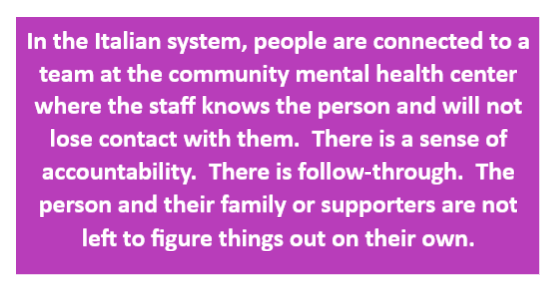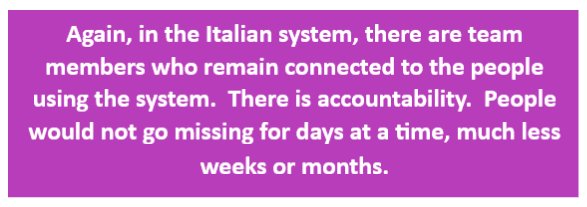Mommy, Please Don’t Ever Let That Happen to Me Again
Over the course of my journey trying to make sense of the American mental health system, I have encountered stories from consumers and families that haunt me. This particular friend is someone I’ve known for about 15 years – and it wasn’t until late last year that I learned about her daughter. I am going to honor their stories in my accoglienza blog. Susan is the first person I’ve invited to share her story. As the story unfolds, I’m going to "sidebar" with references back to the WHO-recognized Trieste model to show what our system could learn from the Italians.
I am sharing this with a specific intent to target readers who ask me all the time, “what is the failure of our American mental health system?” People genuinely want to know what they can do to help. If you are not ensnared in this system – either as a consumer of services or as a loved one – it is hard to fathom how broken it is. My hope is that these stories help to inform lay people and that they will add their voices to a chorus for change.
My daughter’s journey into the dark abyss of mental illness began a little over twelve years ago when she was 16. Initially, we thought it was teenage rebelliousness, but that quickly changed. Her diagnosis has varied over the years but currently is schizoaffective disorder.
At 17, after numerous involuntary hospitalizations, she was placed at Resnick Neuropsychiatric Hospital. On her behalf, they fought our private insurance company and kept her for three months. During that time, she stabilized, kept up with schoolwork and went on to walk the stage with her high school graduating class; it seemed life was good again!
By 18, no longer a minor, she stopped taking her meds and went on to many more hospitalizations.
She resorted to violent behavior and was arrested for assaulting several police officers. We fought the case for a year and ultimately had it reduced to a misdemeanor and probation.
For the next ten years, she cycled in and out of homelessness and hospitals, both involuntary and voluntary. On January 18, 2018, she attempted suicide and was in a coma for four days. When medically cleared, she was placed on a 5150 hold and then transferred to a behavioral health facility. Within 48 hours, she was discharged to me with just an appointment slip, but no one to follow up to make sure she kept it. This after a suicide attempt and a long history of mental illness!
Her condition continued to deteriorate. A few months later, she was placed on another hold. Her private psychiatrist and I both called the hospital to request they not give her one specific psychotropic drug as she responds very badly to it. The hospital ignored our request and administered it anyway.
The day she was discharged, she threw herself in front of a moving vehicle and was put on another hold. She ended up in a different hospital. Shortly after that, at another facility, they again ignored the request and prescribed the same medication. They discharged her with a bus token and she disappeared until her next 5150.
Assisted Outpatient Treatment: Good Idea in Theory
In October 2018, I referred her to Assisted Outpatient Treatment (AOT) for Los Angeles County and she was accepted. Finally! I thought this would be the answer. But at the time she was accepted, she was missing. She was gone for six weeks, and this was the first time she was gone so long. Those of you that have gone through this know what our family went through. Every day and night, I drove around the places she might frequent. I befriended our homeless neighbors and passed out cigarettes and/or dollar bills desperately trying to find her. I had glimpses of hope – someone spotted her or she checked into the gym to shower every couple of weeks. At least I knew she was alive at those moments.
I learned later that she had attempted to make an appointment at a mental health clinic in downtown LA. She was told to come back in three weeks. Somehow our system cannot or will not flag someone who has been in and out of institutions over and over as someone who needs an appointment. Now.
She finally came home in mid-January, 2019. She was so disoriented, coming out of psychosis, and didn’t know exactly where she had been or for how long. She told me she had been beaten and raped twice. She was dirty and malnourished and she said “Mommy, please don’t ever let that happen to me again.” And I swore I wouldn’t!
This year – in 2019 -- she has been hospitalized eight times; three voluntary and five 5150s. Three hospitalizations occurred just in October – totaling 115 days for this year. She continues to decompensate.
For every mother reading this: put yourself in my shoes.
On her most recent hold , she was found on the sidewalk in downtown LA – naked and burning herself with a lighter. Just prior to that, she was placed on a hold for spitting at a police officer. I was surprised at this behavior because we have family members in law enforcement, and she respects them. When I asked her why she did that she said, “I thought if I got arrested and put in jail, they would have to help me.”
My daughter is crying – no, she is screaming -- for help!
Conservatorship. Walk a Mile in a Mother’s Shoes.
For the past three years, I have been trying, unsuccessfully, to have her conserved. Convincing a treating psychiatrist has been nearly impossible. Over this past summer, on two separate occasions, she was in the psych ER for two weeks and we missed the window with the Public Guardian’s office
After this most recent hold, I called everyone that would listen. What does it take? How bad does it have to get? Suicide attempts apparently aren’t enough. Will five 5150’s in nearly as many months be enough with a history of close to 50 overall? Will being naked and burning yourself be enough?
I’m outraged by the arguments condemning an LPS Conservatorship levied by those who have not lived this nightmare as a parent. I am saddened by those who do not support a redefinition of “grave disability, ” which is the standard by which a judge will grant a conservatorship.
”We don’t want to take away people’s constitutional right,” they say. Living under a bridge and eating out of a garbage can is apparently acceptable – but I have to ask: how many of those who fight against involuntary treatment under the care of the Public Guardian have lived this nightmare as a parent?
As a parent, this is what I say: What about the human right of my daughter to be healthy? To get desperately needed care? To have the opportunity to lead a fulfilling, productive life? To not fall through the myriad of cracks in our failed mental health system and die?
My daughter deserves those rights! She said “Mommy, please don’t ever let that happen to me again!” I ask, no beg, please help me to never let that happen to her again.







